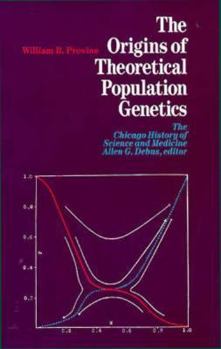Orgins of Theoretical Population Genetics: The Chicago History of Science and Medicine
Select Format
Select Condition 
Book Overview
Tracing the development of population genetics through the writings of such luminaries as Darwin, Galton, Pearson, Fisher, Haldane, and Wright, William B. Provine sheds light on this complex field as... This description may be from another edition of this product.
Format:Paperback
Language:English
ISBN:0226684660
ISBN13:9780226684666
Release Date:January 1987
Publisher:University of Chicago Press
Length:214 Pages
Weight:0.50 lbs.
Dimensions:0.6" x 5.4" x 8.5"
Customer Reviews
1 rating
A fine scholarly history
Published by Thriftbooks.com User , 21 years ago
'Evolution', in its biological sense, is simply any change in the frequencies of genes over time. There has never, so far as I know, been any real argument over whether such evolution occurs. The fuss, certainly ever since 1859, has always been mainly about two things: _how_ it occurs (Does it happen solely by 'natural selection'? If so, by what mechanism(s)? Or does it happen at least partly by design?), and whether it's sufficient to provide a complete account of speciation (and sometimes the origin of life, though strictly speaking this point is not part of the theory of evolution itself). Not that you'd know this from most public debate on the subject. If there's one topic guaranteed to generate letters to the editor written at a grade-school level or below from people who ought to know better (on _both_ sides), this is surely it. Well, if everything you (think you) know about this debate comes from listening to somebody denounce it from the pulpit -- or for that matter from watching 'Inherit the Wind' and/or reading _The Selfish Gene_ -- then you really should educate yourself before sounding off about it. And one thing you'll want to learn is a little of the history of the subject. William Provine's scholarly history of the science of population genetics, originally written in 1971, is a fine place to start. It covers the development of the field from the time of Darwin through the early twentieth century, the period during which the synthesis of Darwinian natural selection and Mendelian genetics was taking place. You'll encounter some familiar names -- of course Darwin and Mendel, but also e.g. Thomas Henry Huxley, Sir Francis Galton, and J.B.S. Haldane. You'll also encounter a number of other names that probably won't be familiar to you unless you already know something about this field (or perhaps about statistics): William Bateson, Karl Pearson, Sir Ronald A. Fisher, and Sewall Wright, for example. And mainly, you'll get a grasp of the way Darwin's theory and the new science of genetics dovetailed and reinforced one another in the synthesis of modern population genetics. If you don't believe in evolutiuon-by-natural-selection yourself, you'll at least begin to see why other people do and what's so intellectually attractive about it. And if you _do_ believe in it yourself, you'll get a healthy sense of the fact that it hasn't ever been a uniform, monolithic theory that left no room for any sort of argument. It would be nice if everybody who felt entitled to an opinion in the evolution debate would read this book. Of course there are also lots of readers who don't need this warning; to them I simply say that this is a readable, well-researched history of its title topic.





